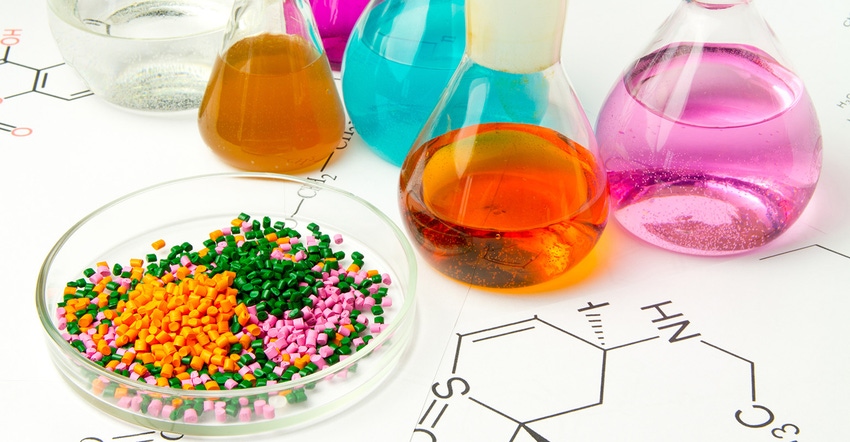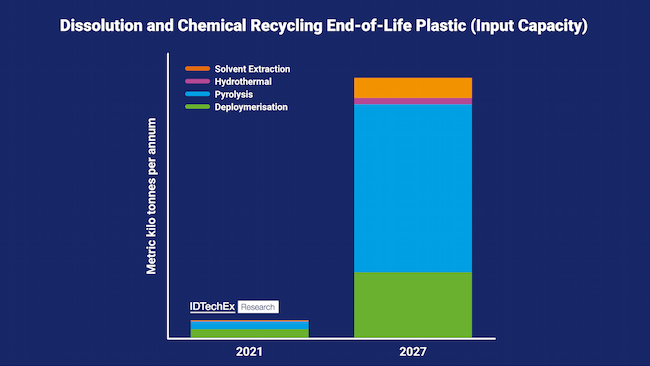Chemically Recycled Plastics Hitch a Ride in Auto Applications
Business intel firm IDTechEx explores markets where chemically recycled plastics have a growing foothold.
January 27, 2023

Chemical recycling of end-of-life plastics has its champions and its critics. IDTechEx does not believe advanced recycling solutions are the much-promised silver bullet, nor does it think they have no role to play in a circular economy. As pyrolysis and depolymerization projects ramp up, one question is where the recycled material will be used?
IDTechEx has published a new report — “Chemical Recycling and Dissolution of Plastics 2023–2033” — replete with company appraisals, technology analysis, and independent market forecasts. The report profiles six main areas looking to adopt chemically recycled products. Overall, IDTechEx forecasts that pyrolysis and depolymerization plants will recycle more than 20 million tonnes/year of plastic waste by 2033.
|
The seatbelt buckle in the Audi Q8 e-Tron is made of recycled plastics. |
One key application area, according to IDTechEx, is the automotive industry. There are two aspects to the role of chemical recycling: First, making use of automotive shredder residue (ASR), and second, generating recycled plastics that have properties capable of replacing fossil-based incumbents. Automotive-grade resins have been launched by the likes of Sabic and Repsol and projects involving USCAR and Eastman, JLR and BASF, and others in this space. In terms of those further along toward commercialization, in 2022 Audi announced a seatbelt buckle for the Q8 e-Tron in collaboration with LyondellBasell, while Mercedes-Benz put into series production a door handle that uses pyrolysis oil from end-of-life tires developed with Pyrum and BASF. Expect to see several more announcements in 2023 and beyond.
Electronics potential
Although less reported, an emerging opportunity lies in the electronics space, mainly for polycarbonate (PC) or PC/ABS (acrylonitrile-butadiene-styrene) blends. Electronic devices are like every other industry in facing pressure to incorporate more recycled material, but much like clothing, consumer-facing premium brands can also benefit from promoting their sustainability credentials.
Mechanically recycled PC is known to be commonly incorporated, although sourcing-related challenges often surface. Several emerging examples of PC derived from pyrolysis oil exist, including materials from Lotte Chemical and Sabic.
|
Market watcher IDTechEx sees potential for chemically recycled feedstock use in plastics for automotive and electronics applications, among others, but concedes that there are question marks about its economic and environmental viability. |
Meanwhile, depolymerization of PC has been explored for several decades but with minimal commercial traction to date. However, depolymerization of PS to generate styrene monomers is a key growth area. Styrene monomers can go back to forming PS but are also being used elsewhere, such as for styrene butadiene rubber (SBR) or ABS. IDTechEx has received reports of commercial examples of chemically recycled styrene currently being used by electronics companies.
Besides automotive and electronics, IDTechEx identifies fast-moving consumer goods packaging, textiles, carpets, and mattresses as major market segments with high potential for absorbing chemically recycled feedstocks.
Regulatory and environmental question marks
Despite optimism from some quarters, it is important to acknowledge the ongoing debate as to how chemical recycling processes are classified and recognized for their green credentials (or lack thereof). The outcome of this will have a significant impact on their uptake. Equally, how this recycling will be tracked and held to account will be a key area to watch.
Most petrochemicals companies favor a mass balance approach, often stating it is the only feasible one. However, current methods have been widely criticized, with many calling for stricter regulations to avoid “creative accounting” and to improve transparency for consumers.
The chemical recycling of plastic waste is a rapidly evolving industry, from regulatory decisions to emerging technology solutions. There will continue to be a raging debate in 2023 surrounding the merits of chemical recycling, as question marks remain over both the economic and environmental viability of the technology. Despite this, use cases are already on the market and are ever expanding.
About the Author(s)
You May Also Like






